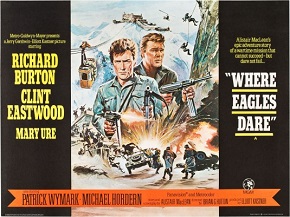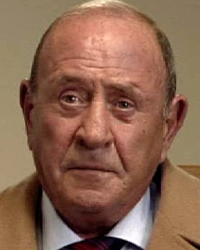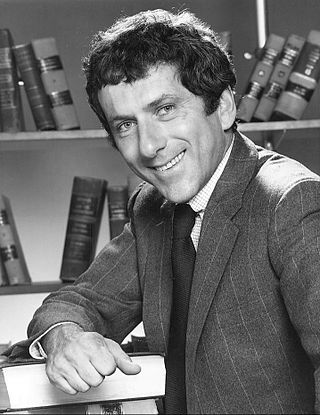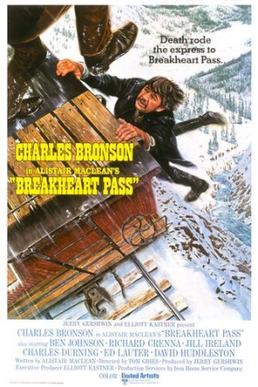Related Research Articles

John Francis Junkin was an English actor and scriptwriter who had a long career in radio, television and film, specialising in comedy.
Alistair Stuart MacLean was a Scottish novelist who wrote popular thrillers and adventure stories. Many of his novels have been adapted to film, most notably The Guns of Navarone (1957) and Ice Station Zebra (1963). In the late 1960s, encouraged by film producer Elliott Kastner, MacLean began to write original screenplays, concurrently with an accompanying novel. The most successful was the first of these, the 1968 film Where Eagles Dare, which was also a bestselling novel. MacLean also published two novels under the pseudonym Ian Stuart. His books are estimated to have sold over 150 million copies, making him one of the best-selling fiction authors of all time.

Alistair Gordon Lethbridge-Stewart, fully Brigadier Sir Alistair Gordon Lethbridge-Stewart, generally referred to simply as the Brigadier, is a fictional character in the British science fiction television series Doctor Who, created by writers Mervyn Haisman and Henry Lincoln and played by Nicholas Courtney. He is one of the founders of UNIT, an international organisation that defends Earth from alien threats, and serves as commander of the British contingent. Presented at first as reluctant to accept the continuing aid of the Doctor, over time the Brigadier became one of the Doctor's greatest friends and his principal ally in defending Earth.

Where Eagles Dare is a 1968 British-American action adventure war thriller spy film directed by Brian G. Hutton and starring Richard Burton, Clint Eastwood and Mary Ure. It follows a Special Operations Executive team of men attempting to save a captured American General from the fictional Schloß Adler fortress, except the mission turns out not to be as it seems. It was filmed in Panavision using the Metrocolor process, and was distributed by Metro-Goldwyn-Mayer. Alistair MacLean wrote the screenplay, his first, at the same time that he wrote the novel of the same name. Both became commercial successes.

Michael Reid was an English comedian, actor, author and occasional television presenter. He played the role of Frank Butcher in the soap opera EastEnders and hosted the children's game show Runaround. He was known for his gravelly voice and strong cockney accent.
Brian Geoffrey Hutton was an American actor and film director whose notable credits include the World War Two action films Where Eagles Dare (1968) and Kelly's Heroes (1970).
Elliott Kastner was an American film producer, whose best known credits include Where Eagles Dare (1968), The Long Goodbye (1973), The Missouri Breaks (1976), and Angel Heart (1987).

Mona Lee Washbourne was an English actress of stage, film, and television. Her most critically acclaimed role was in the film Stevie (1978), late in her career, for which she was nominated for a Golden Globe Award and a BAFTA Award.

Barry Foster Newman was an American actor of stage, screen and television known for his portrayal of Kowalski in Vanishing Point, and for his title role in the 1970s television series Petrocelli. He was nominated for Golden Globe and Emmy awards.

David William Frederick Lodge was an English character actor.

Harper is a 1966 American mystery film based on Ross Macdonald's 1949 novel The Moving Target and adapted for the screen by novelist William Goldman, who admired MacDonald's writings. The film stars Paul Newman as Lew Harper, and was directed by Jack Smight, with a cast that includes Robert Wagner, Julie Harris, Janet Leigh, Shelley Winters, Lauren Bacall, and Arthur Hill.

The Way to Dusty Death is a thriller novel written by Scottish author Alistair MacLean. It was originally published in 1973. The title is a quotation from the famous soliloquy in Act 5, Scene 5 in Shakespeare’s play Macbeth.

Suzy Kendall is a British retired actress best known for her film roles in the late 1960s and early 1970s.

When Eight Bells Toll is a 1971 action film directed by Étienne Périer and starring Anthony Hopkins, Jack Hawkins, Robert Morley, and Nathalie Delon. Set in Scotland, it is based upon Scottish author Alistair MacLean's 1965 novel of the same name. Producer Elliott Kastner planned to produce a string of realistic gritty espionage thrillers to rival the James Bond series, but the film's poor box office receipts ended his plans.

Breakheart Pass is a 1975 American Western film that stars Charles Bronson, Ben Johnson, Richard Crenna, and Jill Ireland. Based on the 1974 novel of the same title by Scottish author Alistair MacLean (1922–1987), it was filmed in north-central Idaho.

Paul Sorensen was an American film, theater and television actor who appeared in hundreds of roles during his career, including The Brady Bunch and Dallas. He was frequently cast in westerns or as a police officer.

The Hostage Tower is a 1980 American spy and thriller television film starring Peter Fonda and Douglas Fairbanks Jr., and directed by Claudio Guzmán, well known for his work in sitcoms. It is based on a story by Alistair MacLean. A book based on MacLean's story by John Denis was the first in the series of UNACO books.

Puppet on a Chain is a 1970 British thriller film directed by Geoffrey Reeve and starring Sven-Bertil Taube, Barbara Parkins and Alexander Knox. It is based on the 1969 novel Puppet on a Chain by Alistair MacLean.
Charles Tyner was an American film, television and stage character actor best known, principally, for his performances in the films Harold and Maude (1971), Emperor of the North Pole (1973), The Stone Killer (1973), The Longest Yard (1974), Evilspeak (1982), Planes, Trains and Automobiles (1987) and Pulse (1988).
Fear Is the Key may refer to:
References
- ↑ Moody, Paul (2018). EMI Films and the Limits of British Cinema. Palgrave MacMillan. p. 115.
- ↑ Ring, Frances. (Nov 5, 1961). "Bravado Gets Workout". Los Angeles Times. p. A21.
- ↑ Johnstone, Jain. (Dec 17, 1972). "War Is Hell, but It Pays Off for MacLean: War Pays Off for MacLean War Pays Off for MacLean War is Hell, but It Pays Off for Alistair". Los Angeles Times. p. 1.
- ↑ Webster, Jack (1991). Alistair MacLean: A Life. Chapmans. p. 140.
- ↑ "AN INTERVIEW WITH BARRY NEWMAN (PART 3 OF 3)". Money Into Light.
- ↑ "Paramount gets distribution rights to film". Calgary Herald. 28 July 1972. p. 29.
- ↑ DAVID LEWIN (May 11, 1980). "Alistair MacLean's Eiffel Tower Drama". The New York Times. p. D37.
- ↑ Harper, Sue (2011). British Film Culture in the 1970s: The Boundaries of Pleasure: The Boundaries of Pleasure. Edinburgh University Press. p. 270. ISBN 9780748654260.
- ↑ Swern, Phil (1995). The Guinness book of box office hits. Guinness Publishing. p. 192.